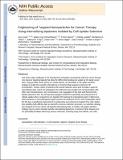Engineering of Targeted Nanoparticles for Cancer Therapy Using Internalizing Aptamers Isolated by Cell-Uptake Selection
Author(s)
Xiao, Zeyu; Levy-Nissenbaum, Etgar; Alexis, Frank; Luptak, Andrej; Teply, Benjamin A.; Chan, Juliana Maria; Shi, Jinjun; Digga, Elise; Cheng, Judy; Langer, Robert; Farokhzad, Omid C.; ... Show more Show less
DownloadLanger_Engineering targeted.pdf (2.821Mb)
PUBLISHER_POLICY
Publisher Policy
Article is made available in accordance with the publisher's policy and may be subject to US copyright law. Please refer to the publisher's site for terms of use.
Terms of use
Metadata
Show full item recordAbstract
One of the major challenges in the development of targeted nanoparticles (NPs) for cancer therapy is to discover targeting ligands that allow for differential binding and uptake by the target cancer cells. Using prostate cancer (PCa) as a model disease, we developed a cell-uptake selection strategy to isolate PCa-specific internalizing 2′-O-methyl RNA aptamers (Apts) for NP incorporation. Twelve cycles of selection and counter-selection were done to obtain a panel of internalizing Apts, which can distinguish PCa cells from nonprostate and normal prostate cells. After Apt characterization, size minimization, and conjugation of the Apts with fluorescently labeled polymeric NPs, the NP–Apt conjugates exhibit PCa specificity and enhancement in cellular uptake when compared to nontargeted NPs lacking the internalizing Apts. Furthermore, when docetaxel, a chemotherapeutic agent used for the treatment of PCa, was encapsulated within the NP–Apt, a significant improvement in cytotoxicity was achieved in targeted PCa cells. Rather than isolating high-affinity Apts as reported in previous selection processes, our selection strategy was designed to enrich cancer cell-specific internalizing Apts. A similar cell-uptake selection strategy may be used to develop specific internalizing ligands for a myriad of other diseases and can potentially facilitate delivering various molecules, including drugs and siRNAs, into target cells.
Date issued
2012-01Department
MIT-Harvard Center for Cancer Nanotechnology Excellence; Massachusetts Institute of Technology. Institute for Medical Engineering & Science; Massachusetts Institute of Technology. Department of Biology; Koch Institute for Integrative Cancer Research at MITJournal
ACS Nano
Publisher
American Chemical Society
Citation
Xiao, Zeyu, Etgar Levy-Nissenbaum, Frank Alexis, Andrej Lupták, Benjamin A. Teply, Juliana M. Chan, Jinjun Shi, et al. Engineering of Targeted Nanoparticles for Cancer Therapy Using Internalizing Aptamers Isolated by Cell-Uptake Selection. ACS Nano 6, no. 1 (January 24, 2012): 696-704.
Version: Author's final manuscript
ISSN
1936-0851
1936-086X